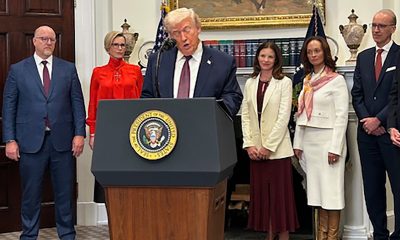a&e features
Images from the Deep South
A photo essay documenting LGBT life in rural Miss., Ala. and La.
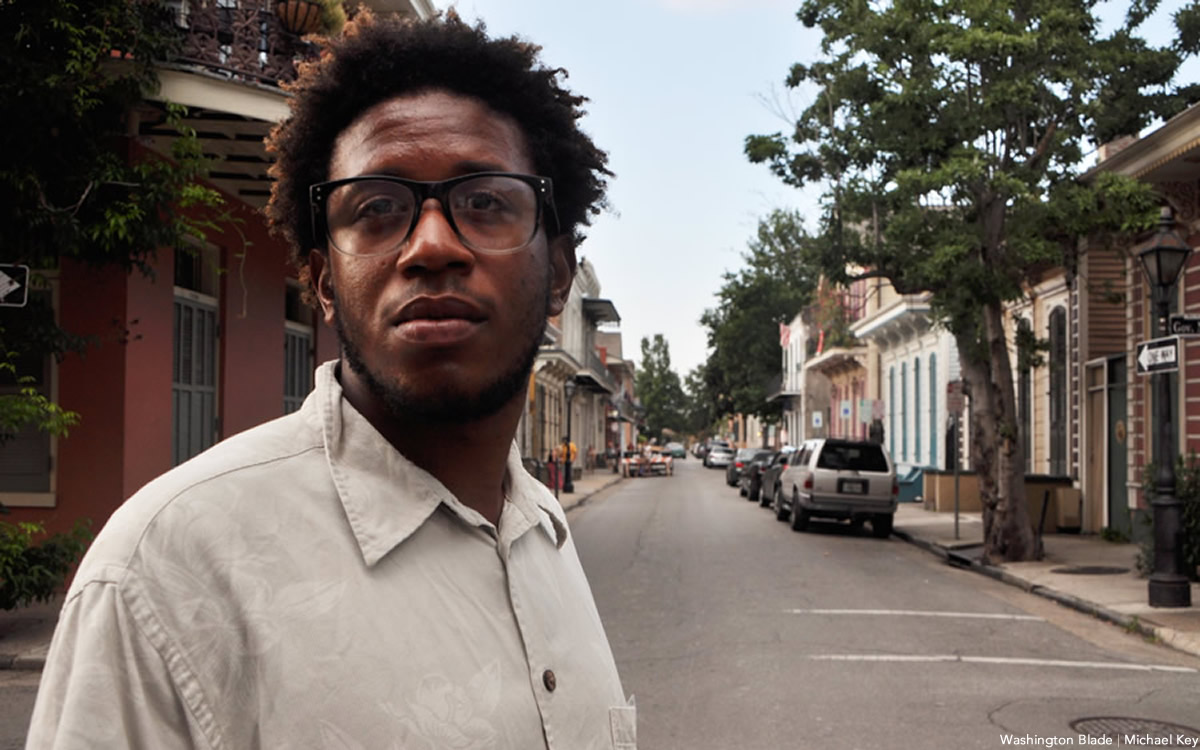
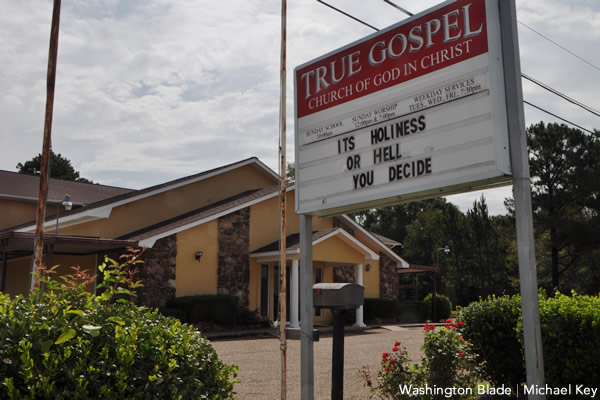
The True Gospel Church of God in Christ is near Jackson, Miss. (Washington Blade photo by Michael Key)
Blade reporter Michael K. Lavers and I earlier this year pitched the idea of going to Alabama, Louisiana and Mississippi to see what LGBT life is like in the South. Living in D.C., we wanted to see for ourselves just how different the experience was for our brothers and sisters who make their homes in places not known for LGBT inclusiveness. Our editor sent us out to gather stories and pictures. We had absolutely no idea what was in store for us.
The Dandelion Project
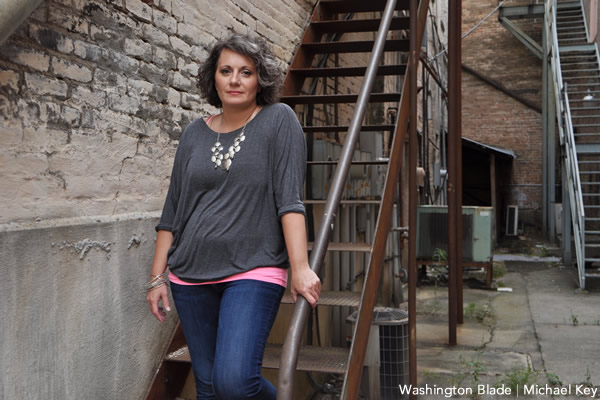
Dandelion Project founder Brandiilyne Dear met with the Washington Blade in Laurel, Miss. (Washington Blade photo by Michael Key)
Our first stop after landing at Medgar Evers International Airport in Jackson, the Mississippi state capital, was in Laurel, Miss. where we met with Dandelion Project founder Rev. Brandiilyne Dear. She told us about her life: how she had been addicted to meth, but then found a calling to the pulpit and got sober. She founded a ministry to help the many addicts who live in the Mississippi Pine Belt. Despite all that she had done through the years for her church, when it was found out that she was a lesbian, everyone — even her own family — turned against her and she “lost everything.”
Dear found her calling elsewhere with the Dandelion Project, a social support group and activist organization for LGBT people in Mississippi. She explained that dandelions are seen as weeds; something to be destroyed, yet are beautiful, ubiquitous and “a good thing.”
We spoke with members of the Dandelion Project, including several gender non-conforming youth who were eager to share their stories of social isolation and the violence and hatred they face.
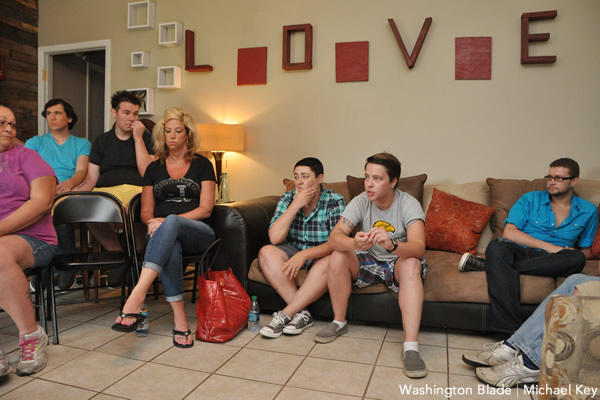
Members of the Dandelion Project meet in Dear’s Mississippi home. (Washington Blade photo by Michael Key)
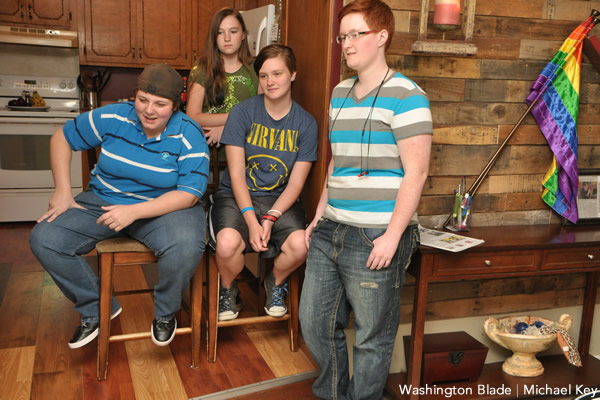
Members of the Dandelion Project gather to discuss issues in a home in Laurel, Miss. (Washington Blade photo by Michael Key)
Despite the daily discrimination they all said they experience, most members of the Dandelion project were proud to continue the fight for equality in their home state. One young person, however, who had just been through a harrowing run for her life from a group intent on doing her harm wished for Mississippi to “fall into the Gulf” of Mexico.
Mississippi Delta
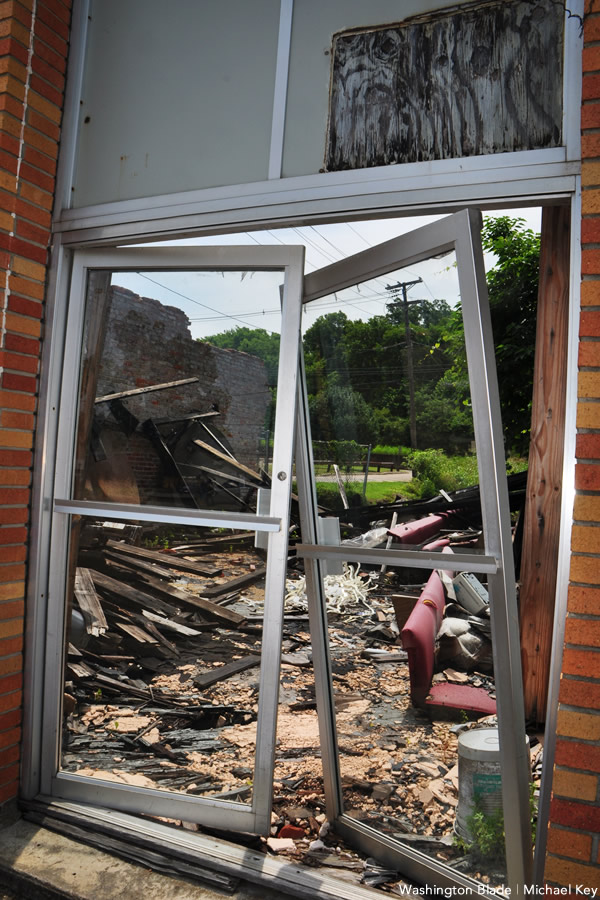
One of the many ruined structures along Main Street in Yazoo City, Miss. stands as a monument to the tornado which passed through the city four years ago. (Washington Blade photo by Michael Key)
Our next stop was in the verdant but poverty-stricken Mississippi Delta. After passing small farming towns and long stretches of countryside, we arrived at the “Gateway to the Delta,” Yazoo City, where we had an appointment with the newly elected Mayor Diane Delaware. A cosmopolitan woman who had worked “all around the world,” Delaware told us that she had “no problem” with same-sex marriage.
Yazoo City, and indeed the entire Mississippi Delta, seemed to have much bigger things to worry about than marriage equality. Abject poverty was compounded with joblessness to make for a grim future for many residents. A tornado had passed through Yazoo City four years before, leaving vast swaths of the city in ruins. The city didn’t have money or private investment to repair its downtown.
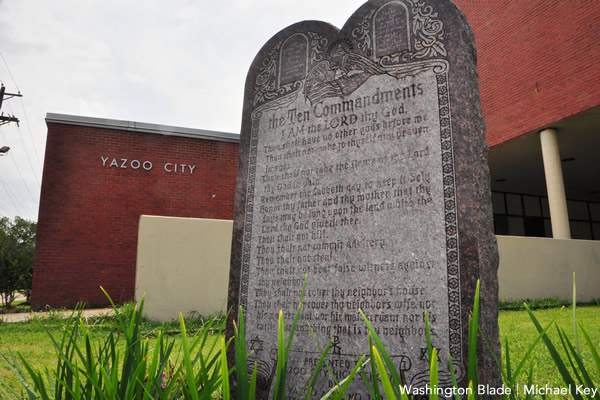
A Ten Commandments marker stands in front of Yazoo City Boys & Girls Club. Such markers are fairly common in Mississippi. (Washington Blade photo by Michael Key)
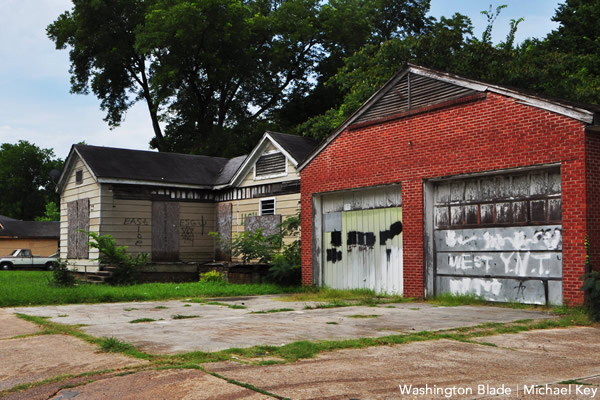
Several homes in Yazoo City, Miss. remain shuttered. (Washington Blade photo by Michael Key)
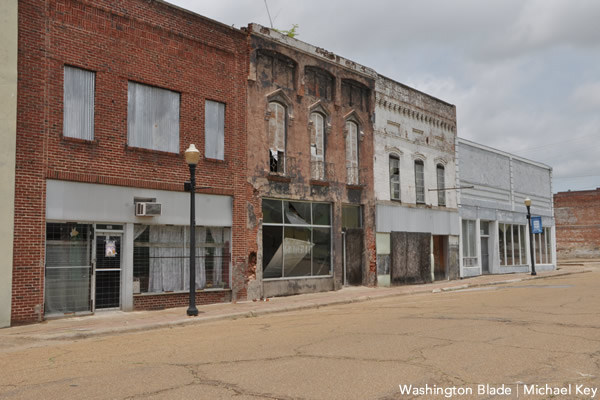
Blocks of Main Street, Yazoo City, Miss. remain largely abandoned. (Washington Blade photo by Michael Key)
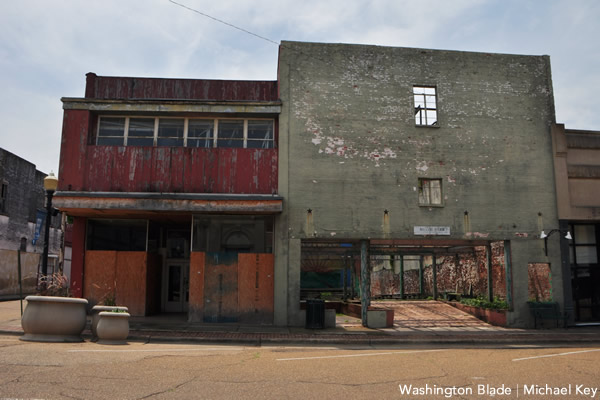
A tornado devastated Main Street, Yazoo City, Miss. four years ago. (Washington Blade photo by Michael Key)
We drove deep into the Mississippi Delta to Greenville on the the Mississippi River. There, we met with an out school teacher, Ryvell Fitzpatrick.
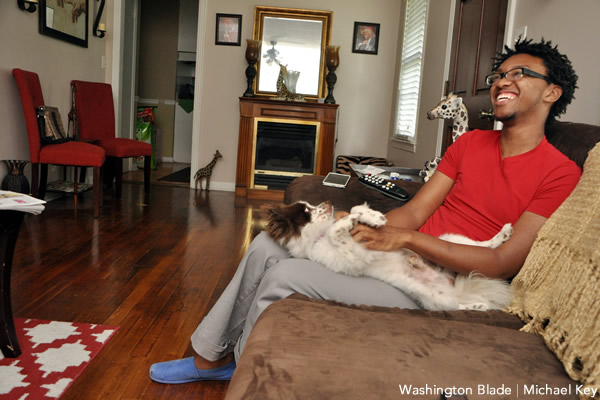
Ryvell Fitzpatrick is a teacher in Greenville, Miss. (Washington Blade photo by Michael Key)
The reluctant pioneer described his life to us as someone who has managed to thrive, despite the difficulties.
We Don’t Discriminate Campaign
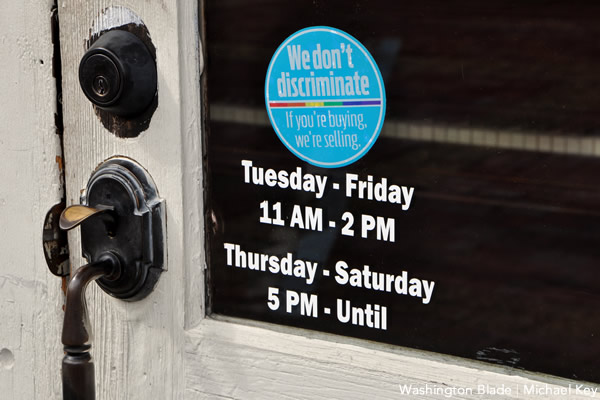
A Mississippi law that opponents argue allows business owners to deny services to LGBT people based on their religious beliefs took effect on July 1. (Washington Blade photo by Michael Key)
Back in Laurel, Dear pointed out the “We Don’t Discriminate” signs on select local businesses. The signs had been placed in store windows following the passage of SB-2681 — the Mississippi Religious Freedom Restoration Act, or so-called “Turn Away the Gays Bill.”
We went to Jackson to track down the organizers of the We Don’t Discriminate Campaign.
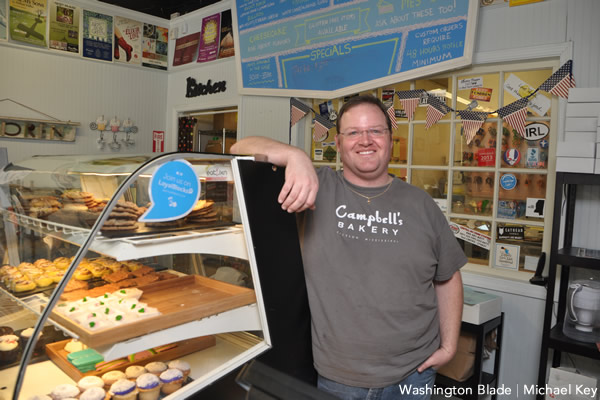
Campbell’s Bakery owner Mitchell Moore is the founder of the ‘We Don’t Discriminate’ campaign. (Washington Blade photo by Michael Key)
We spoke with the founder: a self-described “straight, married, Republican, Christian” entrepreneur named Mitchell Moore who was disgusted that his bakery, the only wedding cake bakery within the Jackson city limits, would be used as a rallying cry for homophobes in the state Senate to justify the anti-gay bill. Following the interview, Moore gave us a large box of confections.
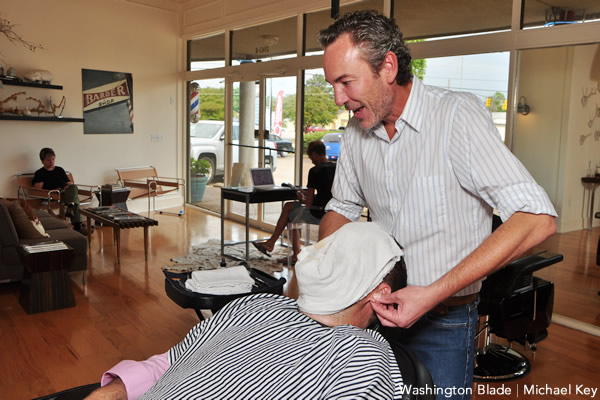
Eddie Outlaw owns a barbershop and salon in Jackson, Miss. (Washington Blade photo by Michael Key)
My reporter traveling companion got a beard trim as he interviewed salon and barbershop owner Eddie Outlaw. Outlaw and his husband Justin McPherson, the subjects of the documentary, “A Mississippi Love Story,” told us about their involvement in the campaign.
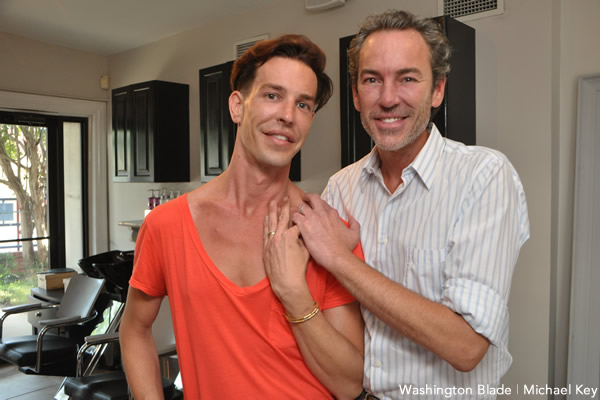
Justin McPherson Outlaw and Eddie Outlaw, owners of a hair salon and barber shop in Jackson, Miss., married in California last year. (Washington Blade photo by Michael Key)
We met with a group of LGBT rights advocates who spent their evening drinking beer, eating hors d’oeuvres and stuffing envelopes with “We Don’t Discriminate” stickers.
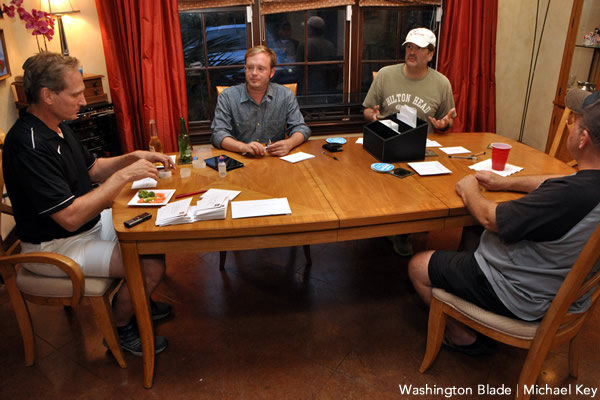
Activists in Jackson, Miss. fill envelopes with ‘We Don’t Discriminate’ literature. (Washington Blade photo by Michael Key)
They were all excited by the success of the campaign in generating buzz around the nation, and hopeful about change to come.
Late at night, we met with performance artist Constance Gordon in the dressing room of a club frequented by LGBT people of color. She explained to us the intersection of race, class and gender and other dynamics in play in Mississippi. Like most we spoke with, she was proud to be from Mississippi, though she acknowledged the rampant discrimination that LGBT people face in her home state.
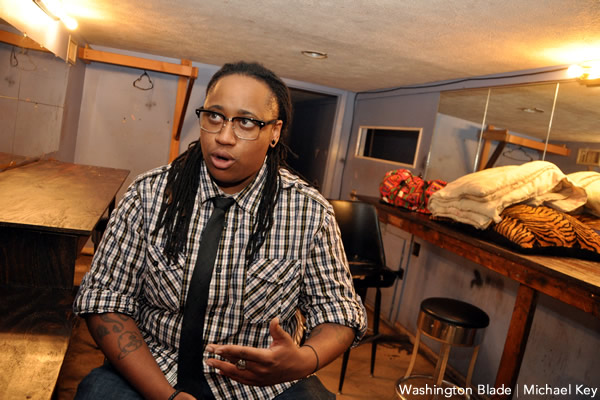
Constance Gordon is a performance artist and promoter in Jackson, Miss. (Washington Blade photo by Michael Key)
The next day, before moving on to Louisiana, we met with HIV/AIDS service providers and advocates at Open Arms Healthcare Center in Jackson. We met the “AIDS Lady,” as she referred to herself, Charlotte “Dot” Norwood. She told us of the struggles that many clients face, including accessing healthcare, finding jobs and even getting enough to eat.
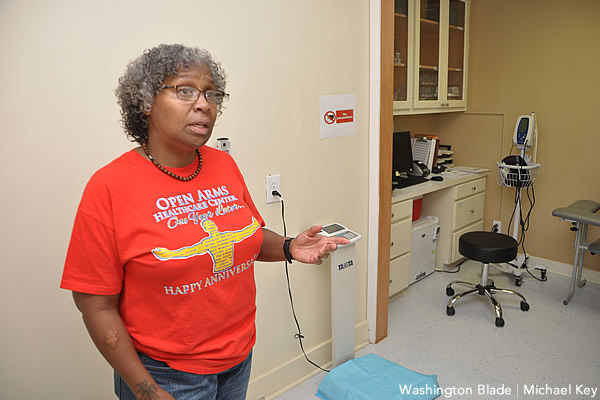
Charlotte “Dot” Norwood has spent years in the fight against HIV/AIDS. (Washington Blade photo by Michael Key)
We also had the pleasure of meeting client-turned-advocate Antwan Matthews. He related to us his story of being a great student but being kicked out of his home when his family found out that he is gay and HIV positive. Despite all of that, he managed to become a peer HIV educator and put himself through college. He is looking forward to graduating with a degree in biology soon.
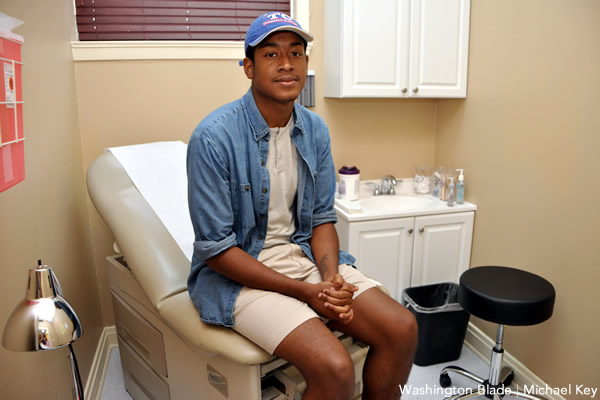
Antwan Matthews is a student and peer HIV educator. (Washington Blade photo by Michael Key)
Baton Rouge
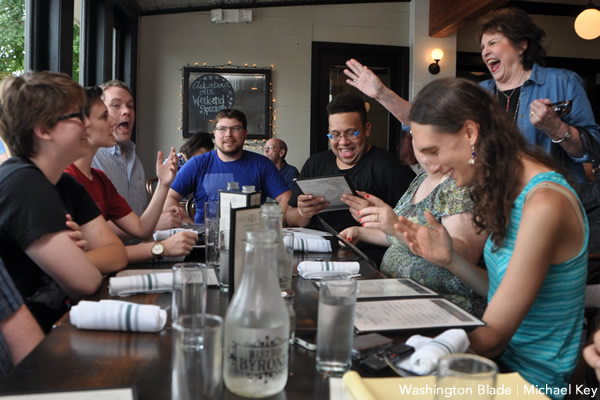
Carol Frazier, on upper right, greets fellow LGBT rights advocates at a restaurant in Baton Rouge, La., on July 12, 2014. (Washington Blade photo by Michael Key)
We left Mississippi behind and drove south to Baton Rouge. We stopped at Bistro Byronz to meet with members of PFLAG Baton Rouge, Equality Louisiana, Louisiana Trans Advocates and Baton Rouge Pride. Michael tried to start the interviews, but the ebullient Carol Frazier of PFLAG insisted that in the South, people eat together before they get down to business. We polished off our crawfish étouffée and listened to stories from the gathered activists about their lives and work.
Many of those gathered at our table struggled with poverty and employment, like transgender woman Ksaa Zair who had difficulty in finding a job because of her gender presentation and had to resort to illegally attaining hormones over the Internet because she could not afford proper medical care in the U.S., or her roommate Sergio Oramas who worked as many overtime hours as he could at a warehouse, yet struggled to pay rent.
Other advocates we spoke with dealt with loss, like Frazier: her gay son had committed suicide. She then dedicated her life to helping LGBT people as the president of PFLAG Baton Rouge until health issues forced her to take a less active role.
All of the assembled activists had come together as a close-knit community. After Hurricane Katrina, tens of thousands of people moved to Baton Rouge and the nascent LGBT community began to solidify. The city’s first Pride celebration was held in 2007, organized by Tom Merrill and other members of Baton Rouge Pride.
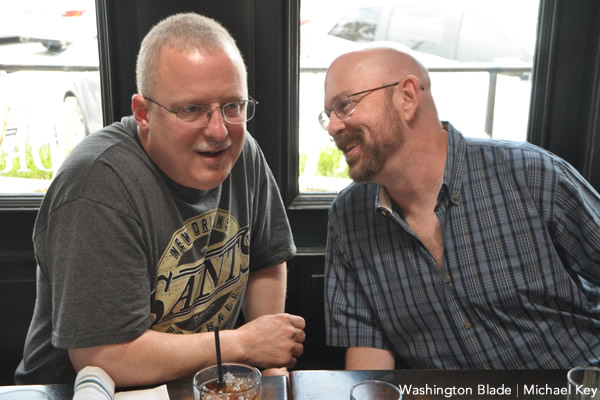
From left; Tom Merrill and Rick Cain are organizers of Baton Rouge Pride. (Washington Blade photo by Michael Key)
After many hugs and farewells to our friendly dining companions, Michael and I left the sweltering heat of Baton Rouge and drove through the swamps of Louisiana to New Orleans.
New Orleans
After spending an evening touring the French Quarter and sampling crawfish pie and signature “hand grenade” drinks on Bourbon Street, Michael and I got some much-needed rest.
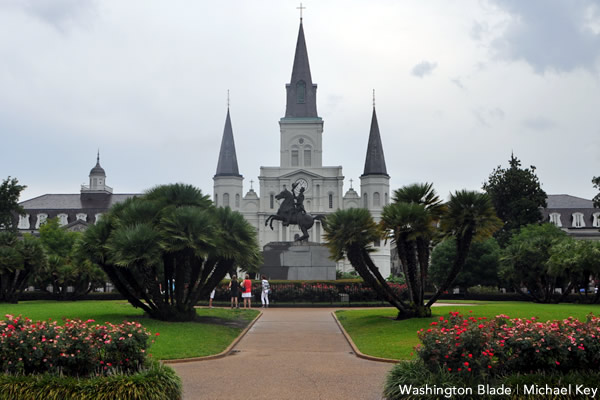
The St. Louis Cathedral in the French Quarter of New Orleans is a spot popular with tourists. (Washington Blade photo by Michael Key)
The next day, we met with activists in Metairie, La. who told us of the ups and downs of LGBT life in the New Orleans area. PFLAG New Orleans Co-President Julie Thompson, who had lost her gay son due to a medical emergency in the middle of a hurricane, beamed proudly about the time she went to Southern Decadence with him and how nice everyone was to her at gay bars. She, and the others gathered, spoke of how different everything was after Katrina and how the once-vibrant LGBT community of New Orleans was only now getting to where it was before the levees burst.
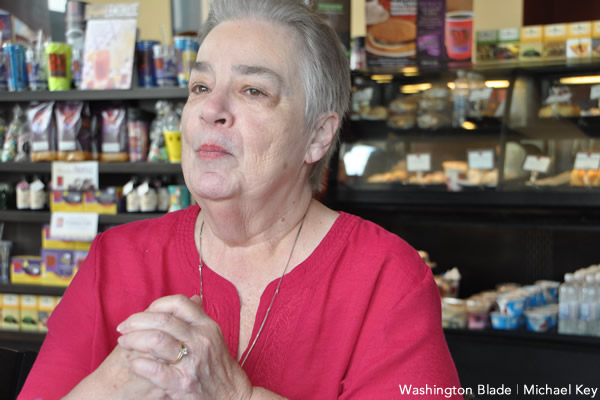
Co-President of PFLAG New Orleans Julie Thompson recalled many happy memories with her late gay son. (Washington Blade photo by Michael Key)
Louisiana Trans Advocates President Elizabeth Anne Jenkins told us how the destruction of the city meant the wholesale dismantling of an infrastructure for support for the local trans population, from doctors to support networks.
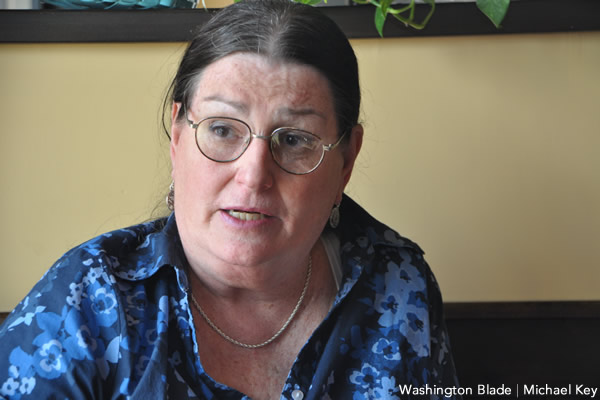
Elizabeth Anne Jenkins is the president of Louisiana Trans Advocates. (Washington Blade photo by Michael Key)
Michael and I wanted to see the devastated Lower Ninth Ward for ourselves. There were rows and rows of foundations with no houses, empty streets with only weeds on the block. But there were bright spots. The Make It Right Foundation had rebuilt a portion of the neighborhood with gleaming, eco-friendly, hurricane resistant homes.
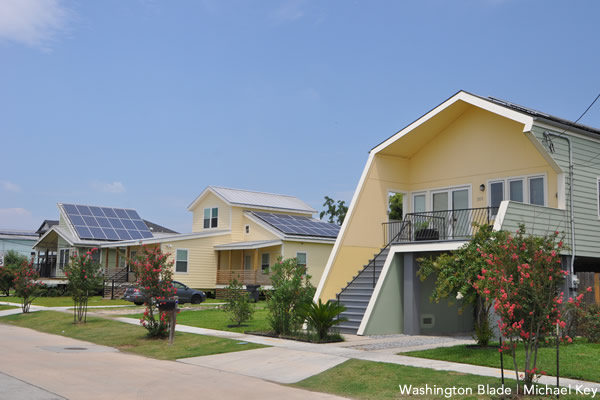
Several eco-friendly homes have been built in the Lower Ninth Ward. (Washington Blade photo by Michael Key)
But, it only took a trip across the bridge to the Upper Ninth Ward to see that the region is far from recovered. Many homes remain boarded shut, overgrown with creeping vines.
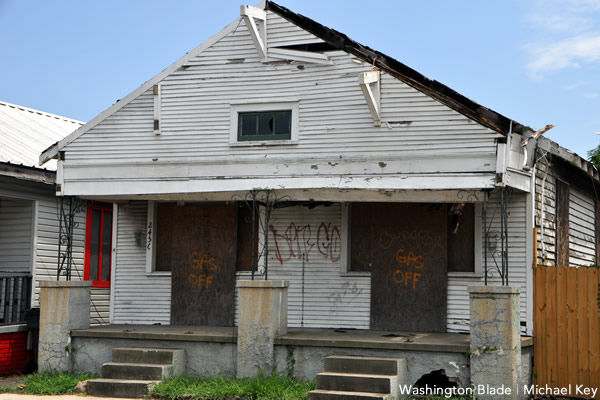
Several homes remain shuttered in the Upper Ninth Ward of New Orleans nine years after Katrina. (Washington Blade photo by Michael Key)
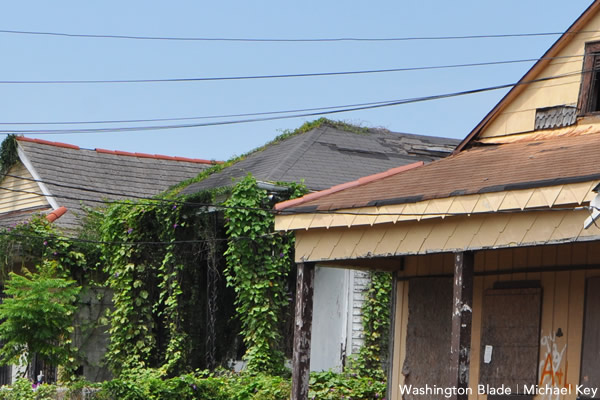
Homes in the Upper Ninth Ward of New Orleans have been reclaimed by nature and sit abandoned. (Washington Blade photo by Michael Key)
HIV in New Orleans
That evening, we met with peer educator Timothy Thompson of the New Orleans AIDS Task Force for dinner in the French Quarter. He told us of the problem of the stigma of an HIV-positive diagnosis driving many to avoid being tested. Many misconceptions about HIV/AIDS persist among people that Thompson had met with, including fears that HIV could be spread by sharing a meal.
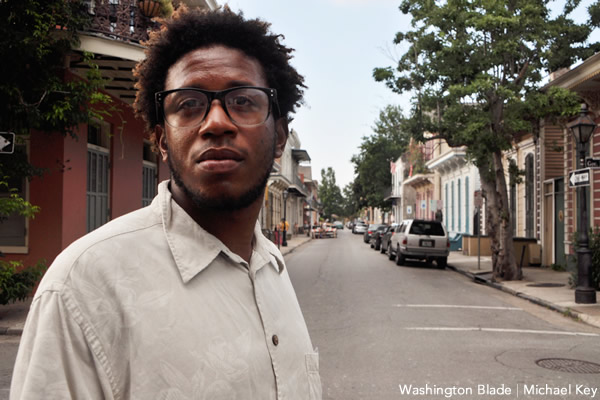
Timothy Thompson is a peer educator with New Orleans AIDS Task Force. (Washington Blade photo by Michael Key)
In the morning, we made our last stop in New Orleans: Belle Reve. Belle Reve is a residence for people with HIV that provides medical care and helps residents to get back on their feet. Vicki Weeks, its executive director, told us of all of the programs offered at the center and proudly guided us around. She, and other staff and residents, had been through a traumatic several months living as refugees in the aftermath of Katrina. But the center is now restored and provides life-saving treatment to people who are often at the end of their rope.
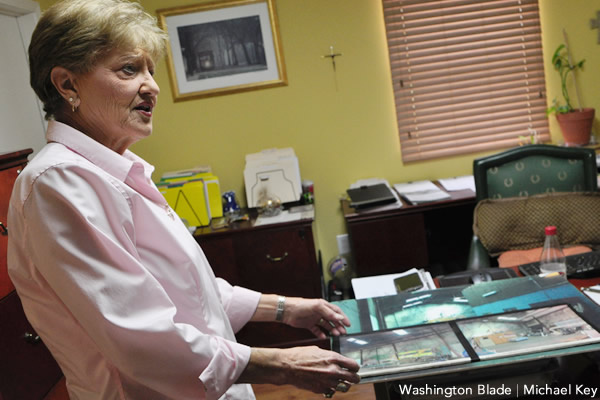
Belle Reve Executive Director Vicki Weeks shows photos of the hurricane damage to the Belle Reve facility. (Washington Blade photo by Michael Key)
One such resident was Carl Green who had lost his job after it was discovered that he was HIV positive. He became homeless and without access to medical treatment, deteriorated rapidly. Belle Reve took him in and nursed him back to health.
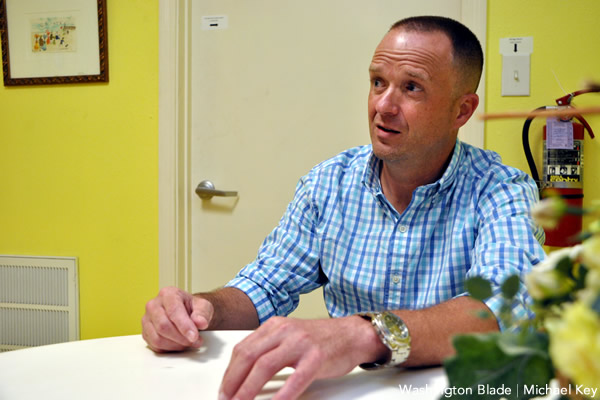
Carl Green is a resident at Belle Reve. (Washington Blade photo by Michael Key)
We also met with Miss Eddie who had ridden out Katrina in New Orleans before becoming a resident at Belle Reve.
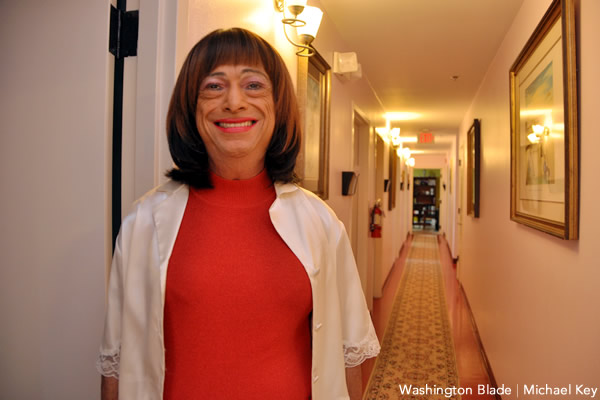
Miss Eddie told the Blade, ‘It’s a great blessing being here,’ in the Belle Reve facility in New Orleans. (Washington Blade photo by Michael Key)
Gulf Coast
We left New Orleans and drove to the Mississippi Gulf Coast. Where houses once stood along the shore, now only foundations remained. Many had rebuilt, but the scars of the hurricane were ever present.
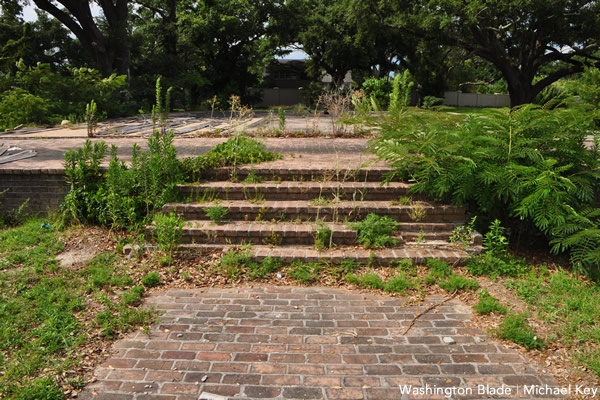
Foundations are all that remain of many homes along the Gulf Coast in Gulfport, Miss., destroyed during Hurricane Katrina. (Washington Blade photo by Michael Key)
Our first stop on the coast was to meet Jeff White and John Perkins, co-founders of the Mississippi Gulf Coast Lesbian and Gay Community Center. We shared queso and a margarita with them at a Mexican restaurant in Gulfport. They told us of how it was difficult for LGBT people to be out in any capacity in the area. They were even worried that the people in the restaurant might be looking at us. White then related a horrifying story about how he had been repeatedly raped by a teacher at his private Baptist school as an openly gay teenager to make him “hate men and change.”
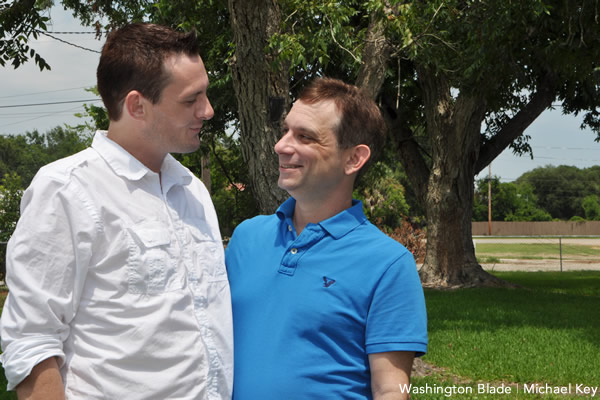
Jeff White and John Perkins are the co-founders of the Mississippi Gulf Coast Lesbian and Gay Community Center. (Washington Blade photo by Michael Key)
We drove along the coast to a mall in nearby Biloxi, where we met with Jennifer and Jena Pierce and a trans man who preferred to remain anonymous. The Pierces married in Connecticut last December, yet lived in Mississippi. They had considered moving to a place more accepting of their relationship, but decided to stay for the sake of their young daughter who is in school. The married couple had faced discrimination on a number of occasions. Jena Pierce told us that an employee at the DMV office loudly gathered her coworkers and told her she could not change the last name on her driver’s license because the state would not recognize her marriage. The DMV worker proceeded to publicly embarrass her, leaving her sobbing in her car.
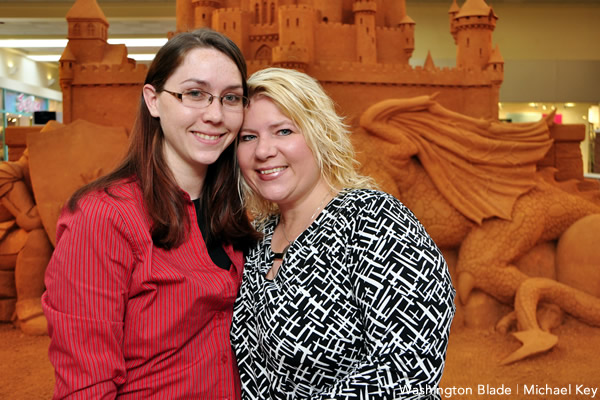
Jennifer and Jena Pierce are a married couple in Biloxi, Miss. (Washington Blade photo by Michael Key)
Jennifer Pierce had also experienced discrimination when trying to take a family leave day to take their daughter to the doctor’s office. Her workplace wouldn’t let her go because their daughter isn’t her biological daughter — even though the people making the decision had been guests at the Pierces’ wedding reception.
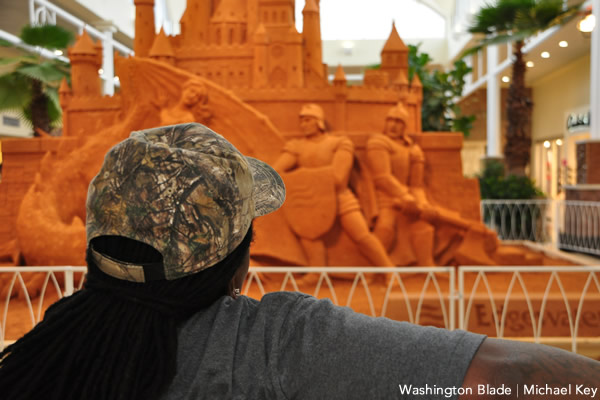
A trans man on the Gulf Coast preferred to remain anonymous but spoke to the Blade about his experience as a trans man living on the Gulf Coast. (Washington Blade photo by Michael Key)
Alabama
It was in the early evening when we pulled into the parking lot of Laps on the Causeway, a sprawling restaurant along a thin stretch of land in the middle of Mobile Bay. Michael and I battled a swarm of gnats to meet with Lane Galbraith on the outdoor deck of his favorite restaurant. The trans man who had founded LGBT Wave of Hope, a Mobile LGBT advocacy organization, told us of the pervasive closet of Alabama and the struggles of the LGBT people who live there.
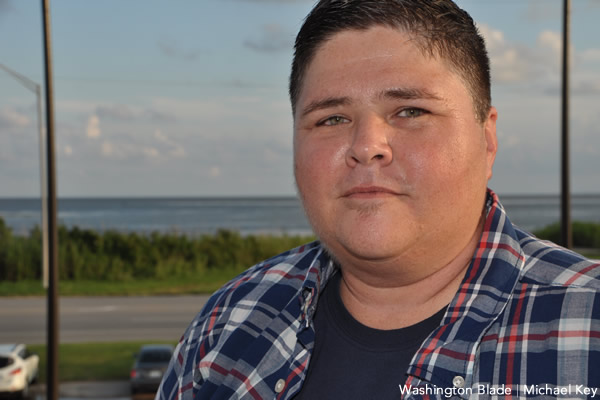
Lane Galbraith is the founder of LGBT Wave of Hope in Mobile, Ala. (Washington Blade photo by Michael Key)
Our final leg of the trip was something that I had been looking forward to for weeks. We drove to Montgomery, Ala. to visit the Southern Poverty Law Center (SPLC). There was as much security at the SPLC as one would expect at the White House. After passing through many checkpoints, I wasn’t even allowed to take pictures inside the massive building. The SPLC’s precautions were well-founded however, as the watchdog organization had been targeted many times by hate groups resulting in fire bombings. We visited the Civil Rights Memorial and got background on the SPLC’s LGBT-specific cases. We met with SPLC lawyers David Dinielli and Sam Wolfe who specialize in LGBT issues.
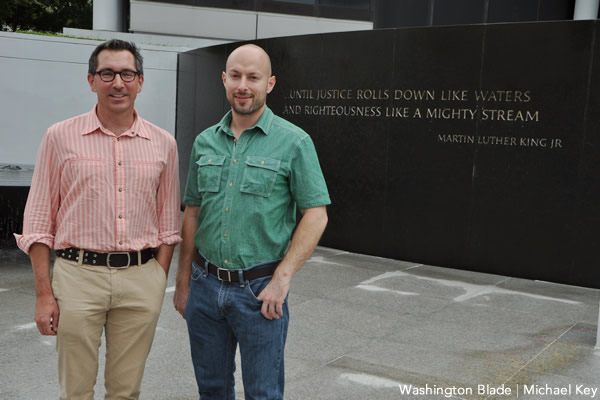
Southern Poverty Law Center Deputy Legal Director David Dinielli and lawyer Sam Wolfe met with the Washington Blade at the Civil Rights Memorial in Montgomery, Ala. (Washington Blade photo by Michael Key)
After meeting with the lawyers, we were granted a visit to the SPLC’s Civil Rights Museum. Upon seeing a display that related the horrifying death of a man in an anti-gay attack, my traveling companion started sobbing. I felt a strange confluence of emotions from the mental and emotional toll our trip had taken as well. After we left the museum, we walked in silence around Montgomery. Signs of the Confederacy were all around us, including the Confederate “White House” of Jefferson Davis.
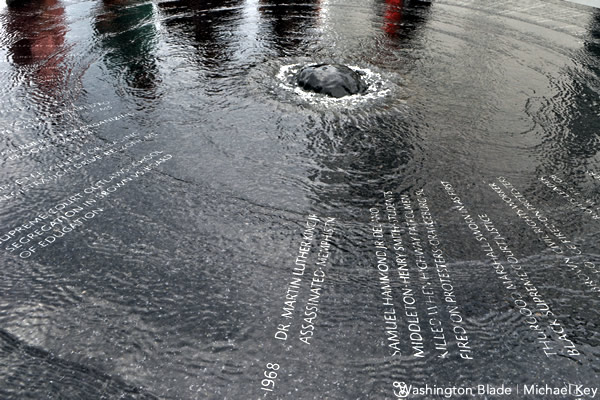
The circular Civil Rights Memorial in Montgomery, Ala. lists martyrs to the cause of civil rights, with a blank spot left for people who came before and those who are yet to come. (Washington Blade photo by Michael Key)
On the last day of our trip, Michael and I were both mentally exhausted, but we had one more important person to talk with. Kathie Heirs of AIDS Alabama met us in her offices in Birmingham to talk about the strides made in combatting the HIV/AIDS epidemic in the state.
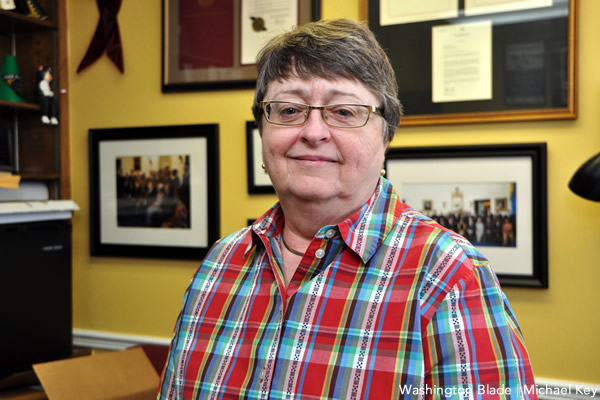
Kathie Hiers is the CEO of AIDS Alabama. (Washington Blade photo by Michael Key)
Michael and I dropped off the rental car at the airport in Birmingham and had a silent drink together while waiting on our flight back to D.C. The many stories I had heard were swirling around in my head and I was too close to it then to make sense of it. I did know two things: I would never take living in a place like Washington for granted again and I would never again succumb to the comforting lie that our full equality had already been won nationwide. The people we had met in the South were amazing and courageous and had built a community in difficult circumstances. Most all of the people we had spoken with had a sense of pride of place and felt a duty to make their town or city a more welcoming home for the next generation of LGBT people.
a&e features
Queer highlights of the 2026 Critics Choice Awards: Aunt Gladys, that ‘Heated Rivalry’ shoutout and more
Amy Madigan’s win in the supporting actress category puts her in serious contention to win the Oscar for ‘Weapons’
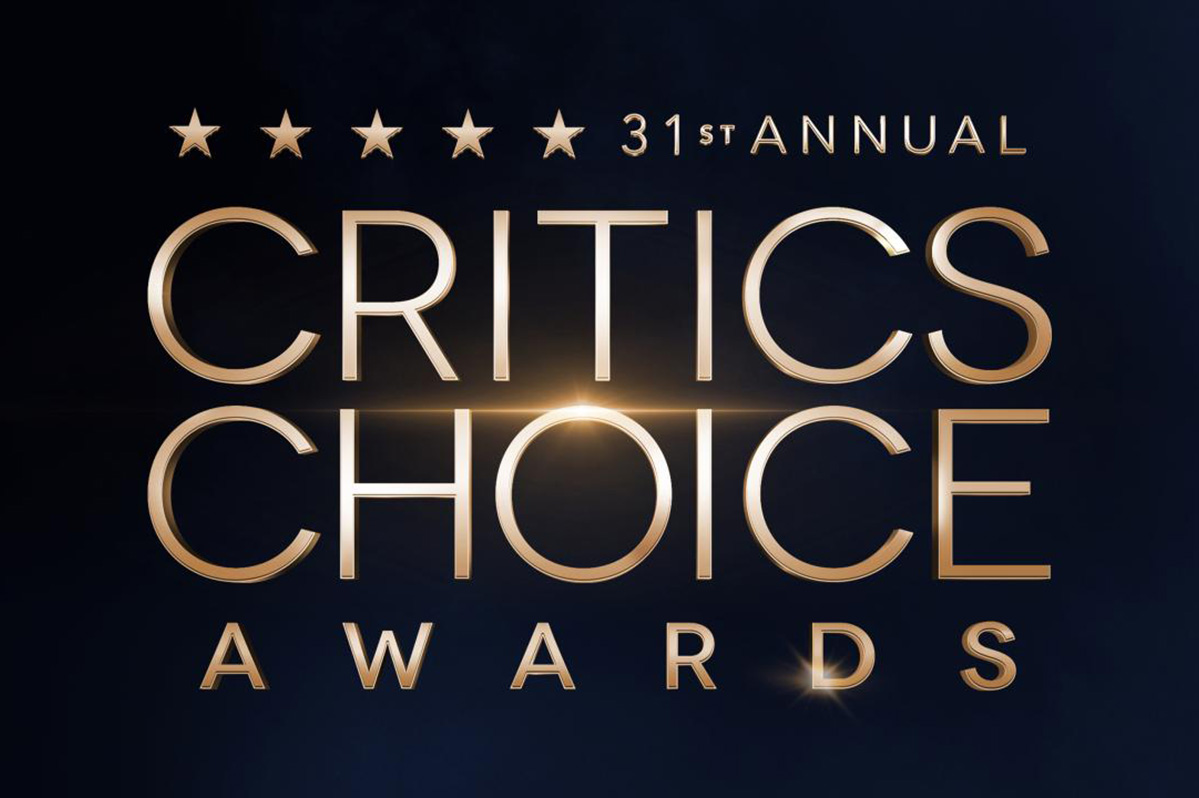
From Chelsea Handler shouting out Heated Rivalry in her opening monologue to Amy Madigan proving that horror performances can (and should) be taken seriously, the Critics Choice Awards provided plenty of iconic moments for queer movie fans to celebrate on the long road to Oscar night.
Handler kicked off the ceremony by recapping the biggest moments in pop culture last year, from Wicked: For Good to Sinners. She also made room to joke about the surprise hit TV sensation on everyone’s minds: “Shoutout to Heated Rivalry. Everyone loves it! Gay men love it, women love it, straight men who say they aren’t gay but work out at Equinox love it!”
The back-to-back wins for Jacob Elordi in Frankenstein and Amy Madigan in Weapons are notable, given the horror bias that awards voters typically have. Aunt Gladys instantly became a pop culture phenomenon within the LGBTQ+ community when Zach Cregger’s hit horror comedy released in August, but the thought that Madigan could be a serious awards contender for such a fun, out-there performance seemed improbable to most months ago. Now, considering the sheer amount of critics’ attention she’s received over the past month, there’s no denying she’s in the running for the Oscar.
“I really wasn’t expecting all of this because I thought people would like the movie, and I thought people would dig Gladys, but you love Gladys! I mean, it’s crazy,” Madigan said during her acceptance speech. “I get [sent] makeup tutorials and paintings. I even got one weird thing about how she’s a sex icon also, which I didn’t go too deep into that one.”
Over on the TV side, Rhea Seehorn won in the incredibly competitive best actress in a drama series category for her acclaimed performance as Carol in Pluribus, beating out the likes of Emmy winner Britt Lower for Severance, Carrie Coon for The White Lotus, and Bella Ramsey for The Last of Us. Pluribus, which was created by Breaking Bad’s showrunner Vince Gilligan, has been celebrated by audiences for its rich exploration of queer trauma and conversion therapy.
Jean Smart was Hack’s only win of the night, as Hannah Einbinder couldn’t repeat her Emmy victory in the supporting actress in a comedy series category against Janelle James, who nabbed a trophy for Abbott Elementary. Hacks lost the best comedy series award to The Studio, as it did at the Emmys in September. And in the limited series category, Erin Doherty repeated her Emmy success in supporting actress, joining in yet another Adolescence awards sweep.
As Oscar fans speculate on what these Critics Choice wins mean for future ceremonies, we have next week’s Golden Globes ceremony to look forward to on Jan. 11.
a&e features
Looking back at the 10 biggest A&E stories of 2025
‘Wicked,’ Lady Gaga’s new era, ‘Sexy’ Bailey and more
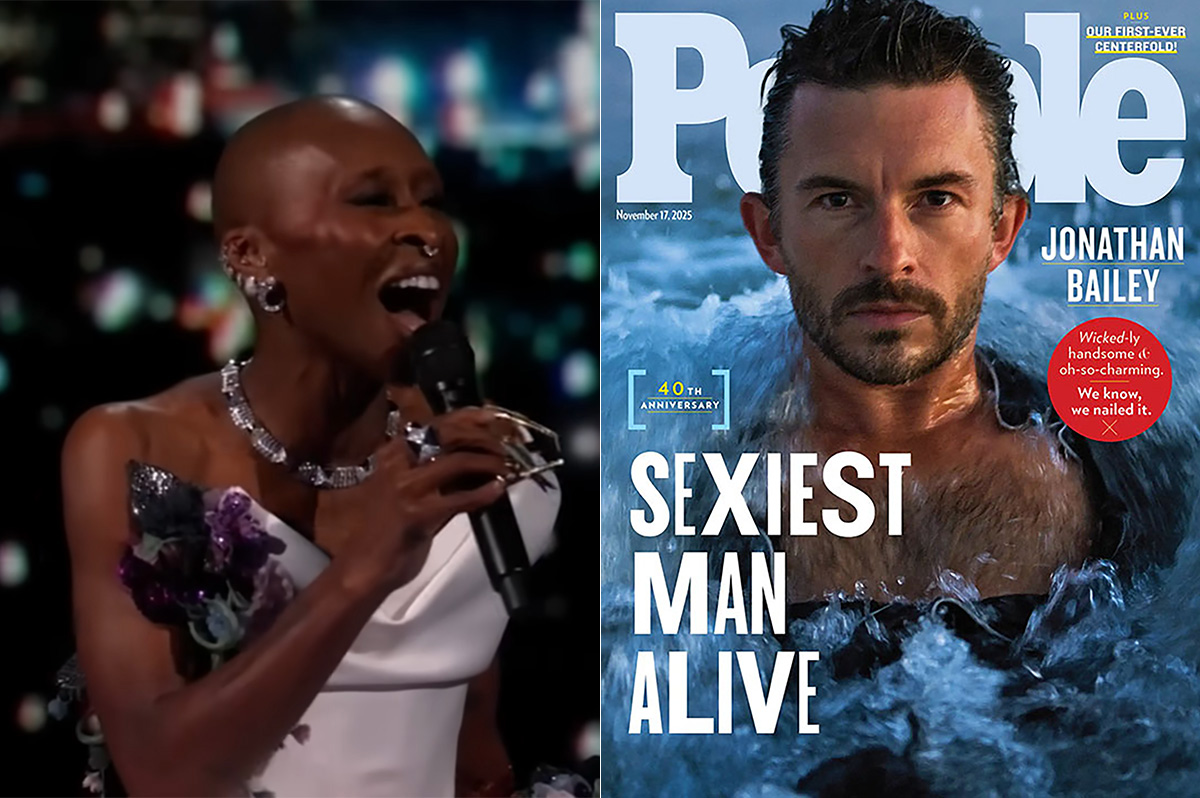
Although 2025 was a year marked by countless attacks on trans rights and political setbacks, the year also saw brilliant queer artists continuing to create art. From Cannes and Sundance Award winners now vying for Oscar consideration to pop icons entering new stages of their careers, queer people persevered to tell their stories through different media.
With the state of the world so uncertain, perhaps there’s no more vital time to celebrate our wins, as seen through some of this year’s top pop culture moments. While there’s no collection of 10 stories that fully encompass “the most important” news, here are some events that got the gays going:
10. ‘Mysterious Gaze of the Flamingo’ wins big at Cannes
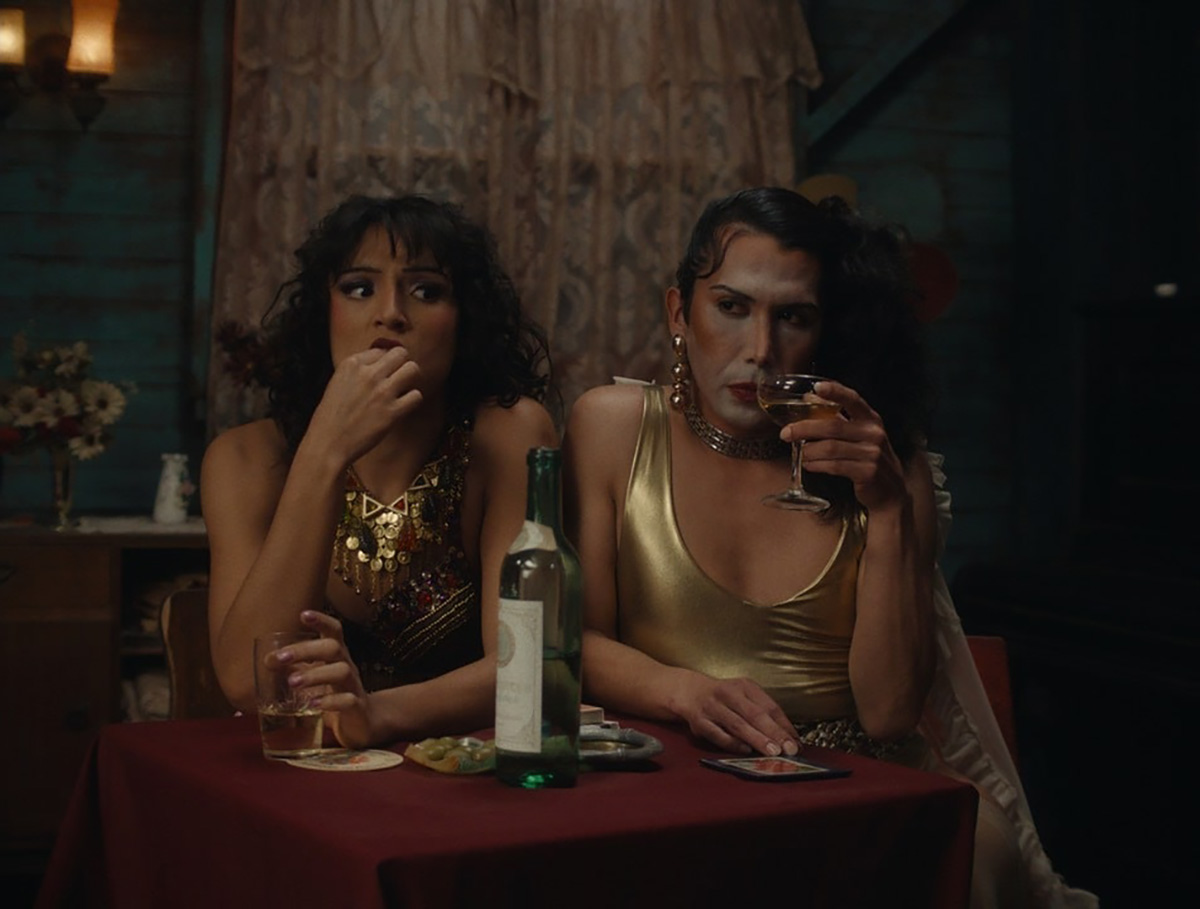
The Cannes Film Festival has become a crucial start for films hoping to make their way to the Oscars, and first-time director Diego Céspedes won the top Un Certain Regard prize for his intimate western “The Mysterious Gaze of the Flamingo.” The film is set in the ‘80s and is intended as an allegory for the AIDS epidemic. Seeing a film that unpacks vital queer history win one of the most coveted awards at Cannes has been a huge point of pride in the independent filmmaking community.
Since the film bowed at Cannes, it has been selected as Chile’s Oscar entry in the Best International Feature race. Speaking with The Blade during the film’s AFI Fest run in October, Céspedes said: At first, I was kind of scared to have this campaign position in the times that we’re living [in] here. But at the same time, I think the Oscars mean a huge platform — a huge platform for art and politics.”
9. ‘The Last of Us’ returns for an even gayer season 2
While the first season of The Last of Us gave us one of TV’s most heartbreaking queer love stories in the episode “Long, Long Time,” Season 2 doubled down on its commitment to queer storytelling with the blossoming relationship between Ellie (Bella Ramsey) and Dina (Isabela Merced). The show expanded on the pair’s relationship in the original video game, making it perhaps the central dynamic to the entire season. That unfortunately came with more homophobic backlash on the internet, but those who checked out all the episodes saw a tender relationship form amid the show’s post-apocalyptic, often violent backdrop. For their performance, Ramsey was once again nominated for an Emmy, but Merced deserved just as much awards attention.
8. ‘Emilia Pérez’ sparks controversy
Jacques Audiard’s genre-bending trans musical “Emilia Pérez” proved to be an awards season juggernaut this time last year, winning the Golden Globe for Best Musical/Comedy. But when the lead star Karla Sofia Gascón’s racist, sexist, and homophobic old tweets resurfaced, the film’s Oscar campaign became a tough sell, especially after Netflix had tried so hard to sell Emilia Pérez as the “progressive” film to vote for. Mind you, the film had already received significant backlash from LGBTQ+ audiences and the Mexican community for its stereotypical and reductive portrayals, but the Gascón controversy made what was originally just social media backlash impossible to ignore. The only person who seemed to come out of the whole debacle unscathed was Zoe Saldaña, who won the Oscar for Best Supporting Actress over Ariana Grande.
7. ‘Sorry, Baby’ establishes Eva Victor as major talent
Back in January at the Sundance Film Festival, Eva Victor (known by many for her brand of sketch comedy) premiered their directorial debut “Sorry, Baby” to rave reviews, even winning the Waldo Salt Screening Award. Victor shadowed Jane Schoenbrun on the set of “I Saw the TV Glow,” and seeing Victor come into their own and establish such a strong voice immediately made them one of independent cinema’s most exciting new voices. A memorable scene in the film sees the main character, Agnes (played by Victor), struggling to check a box for male or female, just one example of how naturally queerness is woven into the fabric of the story.
Most recently, Victor was nominated for a Golden Globe for her performance in the film, and she’s represented in a category alongside Jennifer Lawrence (“Die My Love”), Jessie Buckley (“Hamnet”), Julia Roberts (“After the Hunt”), Renate Reinsve (“Sentimental Value”) and Tessa Thompson (“Hedda”). The film also received four Independent Spirit Award nominations overall.
6. Paul Reubens comes out in posthumous doc
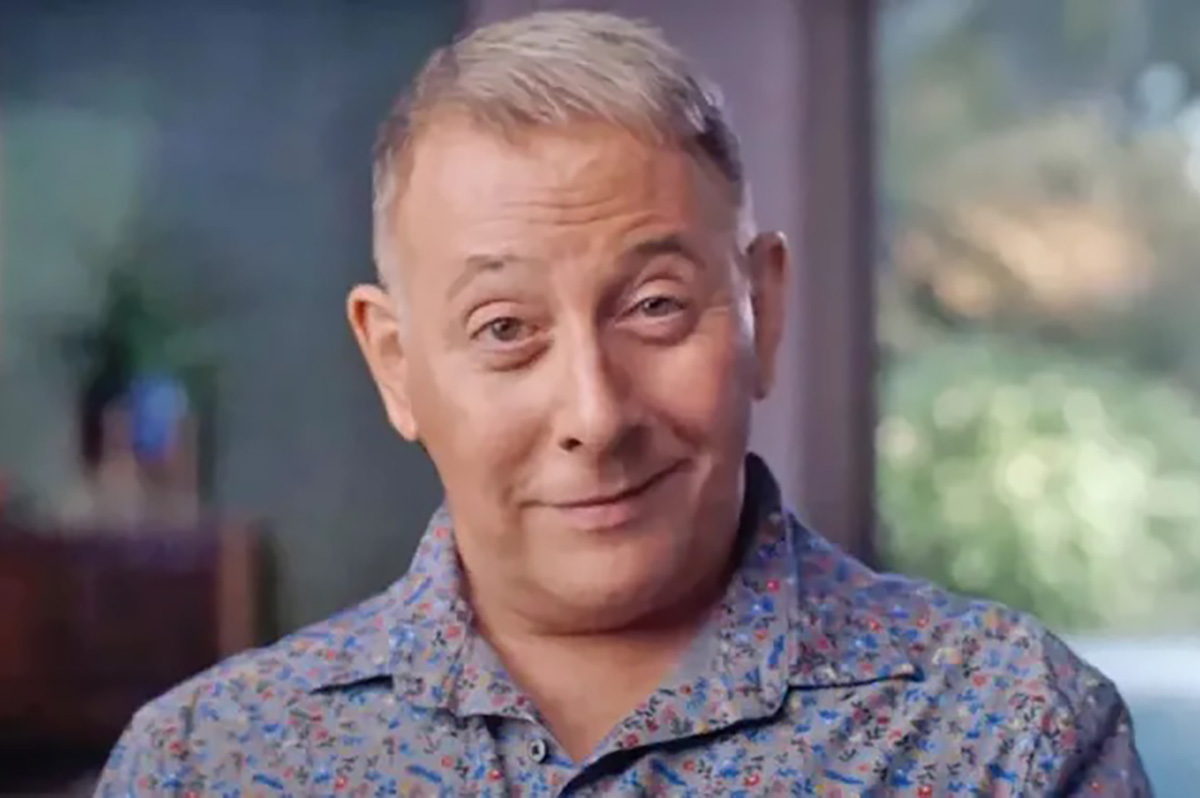
While Paul Reubens never publicly came out as gay before passing away in 2023, the two-part documentary “Pee-wee as Himself” premiered back in May on HBO Max, giving the legendary comedian a chance to posthumously open up to the world. Directed by Matt Wolf, the documentary explores how Reubens found his alter ego Pee-Wee Herman and why he kept his private life private.
The documentary won an Emmy in the Outstanding Documentary or Nonfiction Special category and remains one of the most critically acclaimed titles of the year with a 100% Rotten Tomatoes score. Also worth noting, the National Geographic documentary Sally told the posthumous coming out story of Sally Ride through the help of her long-time partner, Tam O’Shaughnessy.
5. Lady Gaga releases ‘Mayhem’
Lady Gaga entered a new phase of her musical career with the release of Mayhem, her seventh album to date. From the frenzy-inducing pop hit Abracadabra to the memorable Bruno Mars duet featured on “Die With a Smile,” seeing Gaga return to her roots and make an album for the most die-hard of fans was especially rewarding after the underwhelming film releases of “House of Gucci” and “Joker: Folie à Deux.” Gaga has been touring with The Mayhem Ball since July, her first arena tour since 2018. She even extended her tour into 2026 with more North American dates, so the party isn’t stopping anytime soon. And Gaga is even set to make an appearance next May in “The Devil Wears Prada 2.”
4. Cynthia Erivo, Ariana Grande perform at the Oscars
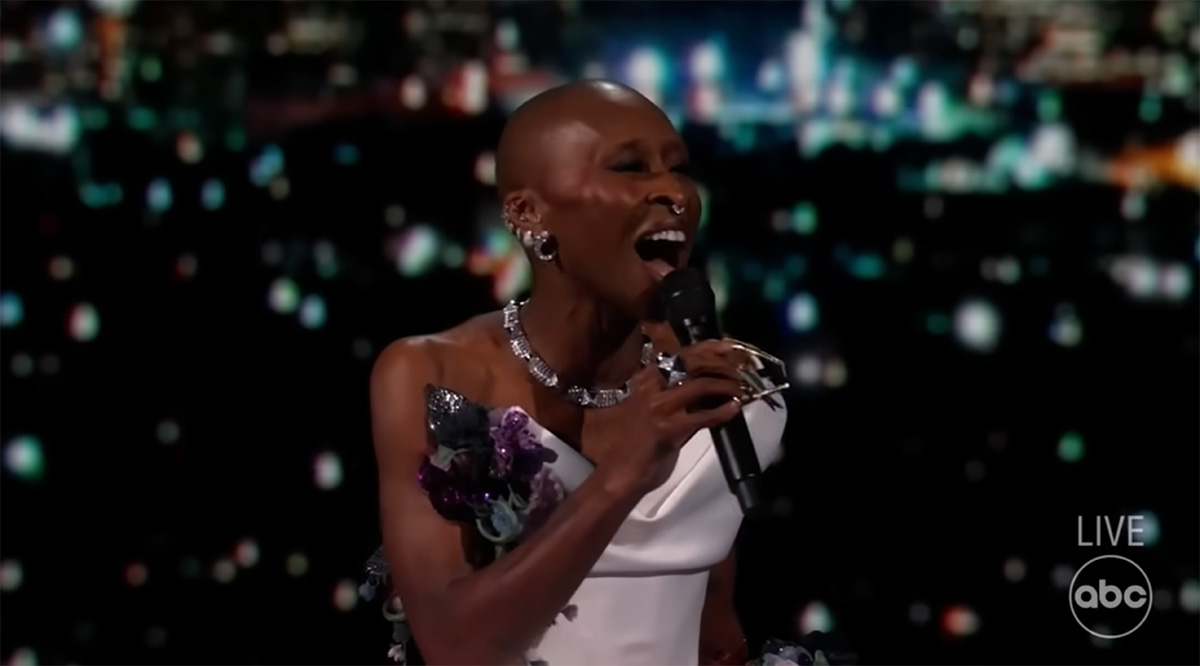
While “Wicked: For Good” didn’t quite reach the heights of the first film, we will forever have Cynthia Erivo and Ariana Grande’s breathtaking live performance that opened the 97th Academy Awards. The pair sang a rendition of “Over the Rainbow,” “Home,” and “Defying Gravity,” paying proper homage to the original 1939 “Wizard of Oz.” Even non-Wicked fans can’t deny how magical and brilliantly staged this performance was. With both Erivo and Grande up for acting Oscars last year, they’re hoping to repeat success and make history with consecutive nominations. Either way, let’s hope there’s another live performance in the making, especially with two new original songs (The Girl in the Bubble and No Place Like Home) in the mix.
3. Indya Moore speaks out against Ryan Murphy
Indya Moore has consistently used social media as a platform for activism, and in September, posted a 30-minute Instagram live speaking out against “Pose” co-creator Ryan Murphy. Moore claimed that Murphy wasn’t being a true activist for trans people. “Ryan Murphy, we need you to do more. You need to address the racism, the violence, and the targeting of people on your productions, Ryan Murphy. You do need to make sure trans people are paid equally. Yes, Janet did the right thing,” Moore said. Murphy was also back in the headlines this year for the critically panned “All’s Fair” and the controversial “Monster: The Ed Gein Story” starring Laurie Metcalf and Charlie Hunnam.
2. Cole Escola wins Tony for Best Leading Actor
Few pop culture moments this year brought us together more than Cole Escola winning a Tony award for “Oh, Mary!” the Broadway show they created, wrote and starred in (we love a triple threat!) Escola made history by becoming the first nonbinary person to win a Tony in the leading actor category, and seeing them excitedly rush to the stage wearing a Bernadette Peters-inspired gown instantly became a viral social media moment.
The cherry on top of Escola’s major moment is the recent news that they are writing a Miss Piggy movie with Jennifer Lawrence and Emma Stone producing — news that also broke the internet for the better. We cannot wait!
1. Jonathan Bailey makes gay history as ‘Sexiest Man Alive’

The same year as his on-screen roles in blockbusters “Jurassic World Rebirth” and “Wicked: For Good,” Jonathan Bailey made history as the first openly gay man to be named People magazine’s “Sexiest Man Alive.” The fact that it took 40 years for an openly gay man to earn the title is a signifier of how far we still have to go with queer representation, and seeing Bailey celebrated is just one small step in the right direction.
“There’s so many people that want to do brilliant stuff who feel like they can’t,” he told PEOPLE, “and I know the LGBT sector is under immense threat at the moment. So it’s been amazing to meet people who have the expertise and see potential that I could have only dreamed of.” In 2024, Bailey founded the charity titled The Shameless Fund, which raises money for LGBTQ+ organizations.
a&e features
Your guide to D.C.’s queer New Year’s Eve parties
Ring in 2026 with drag, leather, Champagne, and more
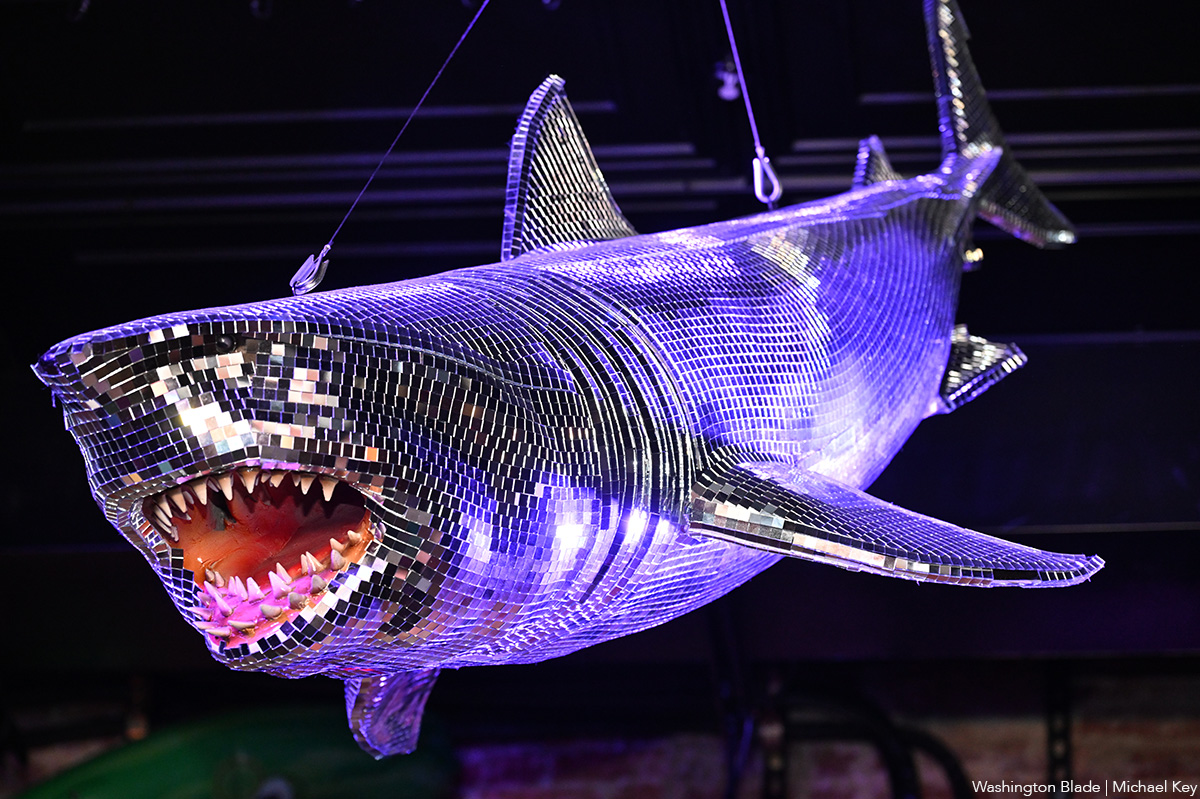
With Christmas in the rear view mirror, we can turn our attention to ringing in a much-anticipated New Year with a slew of local LGBTQ parties. Here’s what’s on tap.
Pitchers
This spacious Adams Morgan bar is hosting the “Pitchers’ Perfect New Year’s Eve.” There will be a midnight Champagne toast, the ball drop on the big screens, and no cover, all night long. The bar doesn’t close until 4 a.m., and the kitchen will be open late (though not until close). All five floors will be open for the party, and party favors are promised.
Trade
D.C.’s hottest bar/club combo is leaning into the Shark motif with its NYE party, “Feeding Frenzy.” The party is a “glitterati-infused Naughty-cal New Year’s Even in the Shark Tank, where the boats are churning and the sharks are circling.” Trade also boasts no cover charge, with doors opening at 5 p.m. and the aforementioned Shark Tank opening at 9 p.m.. Four DJs will be spread across the two spaces; midnight hostess is played by Vagenesis and the two sea sirens sensuously calling are Anathema and Justin Williams.
Number Nine
While Trade will have two DJs as part of one party, Number Nine will host two separate parties, one on each floor. The first floor is classic Number Nine, a more casual-style event with the countdown on TVs and a Champagne midnight toast. There will be no cover and doors open at 5 p.m. Upstairs will be hosted by Capital Sapphics for its second annual NYE gathering. Tickets (about $50) include a midnight Champagne toast, curated drink menu, sapphic DJ set by Rijak, and tarot readings by Yooji.
Crush
Crush will kick off NYE with a free drag bingo at 8 p.m. for the early birds. Post-bingo, there will be a cover for the rest of the evening, featuring two DJs. The cover ($20 limited pre-sale that includes line skip until 11 p.m.; $25 at the door after 9 p.m.) includes one free N/A or Crush, a Champagne toast, and party favors (“the legal kind”). More details on Eventbrite.
Bunker
This subterranean lair is hosting a NYE party entitled “Frosted & Fur: Aspen After Dark New Year’s Eve Celebration.” Arriety from Rupaul Season 15 is set to host, with International DJ Alex Lo. Doors open at 9 p.m. and close at 3 p.m.; there is a midnight Champagne toast. Cover is $25, plus an optional $99 all-you-can-drink package.
District Eagle
This leather-focused bar is hosting “Bulge” for its NYE party. Each District Eagle floor will have its own music and vibe. Doors run from 7 p.m.-3 a.m. and cover is $15. There will be a Champagne toast at midnight, as well as drink specials during the event.
Kiki, Shakiki
Kiki and its new sister bar program Shakiki (in the old Shakers space) will have the same type of party on New Year’s Eve. Both bars open their doors at 5 p.m. and stay open until closing time. Both will offer a Champagne toast at midnight. At Kiki, DJ Vodkatrina will play; at Shakiki, it’ll be DJ Alex Love. Kiki keeps the party going on New Year’s Day, opening at 2 p.m., to celebrate Kiki’s fourth anniversary. There will be a drag show at 6 p.m. and an early 2000s dance party 4-8 p.m.
Spark
This bar and its new menu of alcoholic and twin N/A drinks will host a NYE party with music by DJ Emerald Fox. Given this menu, there will be a complimentary toast at midnight, guests can choose either sparkling wine with or without alcohol. No cover, but Spark is also offering optional wristbands at the door for $35 open bar 11 p.m.-1 a.m. (mid-shelf liquor & all NA drinks).
-

 Photos5 days ago
Photos5 days agoThe year in photos
-

 Sponsored4 days ago
Sponsored4 days agoSafer Ways to Pay for Online Performances and Queer Events
-

 District of Columbia3 days ago
District of Columbia3 days agoTwo pioneering gay journalists to speak at Thursday event
-

 a&e features3 days ago
a&e features3 days agoQueer highlights of the 2026 Critics Choice Awards: Aunt Gladys, that ‘Heated Rivalry’ shoutout and more





